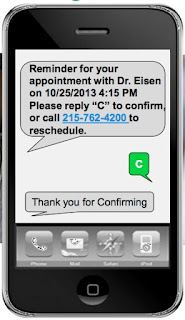- 41% of hospitals were able to send and receive secure messages in 2013.
- CDC’s National Center for Health Statistics found that about 40.4% of physicians said they have used secure messaging and about 8.4% said they had the necessary technology but had not used it.
- An internal survey in 2013 found that new members of Kaiser Permanente Northern California reported higher satisfaction rates and were more likely to re-enroll if they used secure messaging.
- The survey also linked secure messaging use with better quality care and improved logistics. Here are a few statistics about the information sources that physicians seek when using mobile devices according to a Wolters Kluwer Health infographic:
- 72% of physicians access drug information from smartphones.
- 63% of physicians access medical research from tablets. 44% of physicians communicate with nurses and other staff from smartphones.
- To date, 61% of people have downloaded an mHealth app.
For example, Philadelphia-based Hahnemann Hospital conducted a pilot study that introduced a mobile app that supported email and text messaging to over 350 congestive heart failure patients. During this study, patients received email and text message reminders to get them to schedule follow-up appointments after being discharged from the hospital.
As a result, the hospital was able to reduce its 30-day readmissions by 10% that was a 40% improvement over their baseline.
- Readmissions also decreased to 16% for patients who received messages, and the readmissions rate for those who confirmed an appointment was 8.8%, compared to 15.4% for those who didn’t confirm.
- At the end of the 10-month pilot, it was clearly demonstrated that not only could mobile apps help patients to keep their appointments to get the proper follow-up care; it could contribute to reduced hospital costs.

- Of the 100,000 mobile health apps in app stores around the world, 85% of apps are for wellness while the remaining 15% are for medical. Most apps are free to use or free to get started, but there’s also a large portion of apps that are paid.
- Of the mHealth apps available in major app stores, 42% of them adhere to a paid business model.
In 2014 alone, Research2Guidance reported that there were over four million free downloads of mHealth apps every day. That number is expected to keep growing.
By 2017, it’s predicted that 50% of smartphone users will have downloaded mobile health apps.
No comments:
Post a Comment